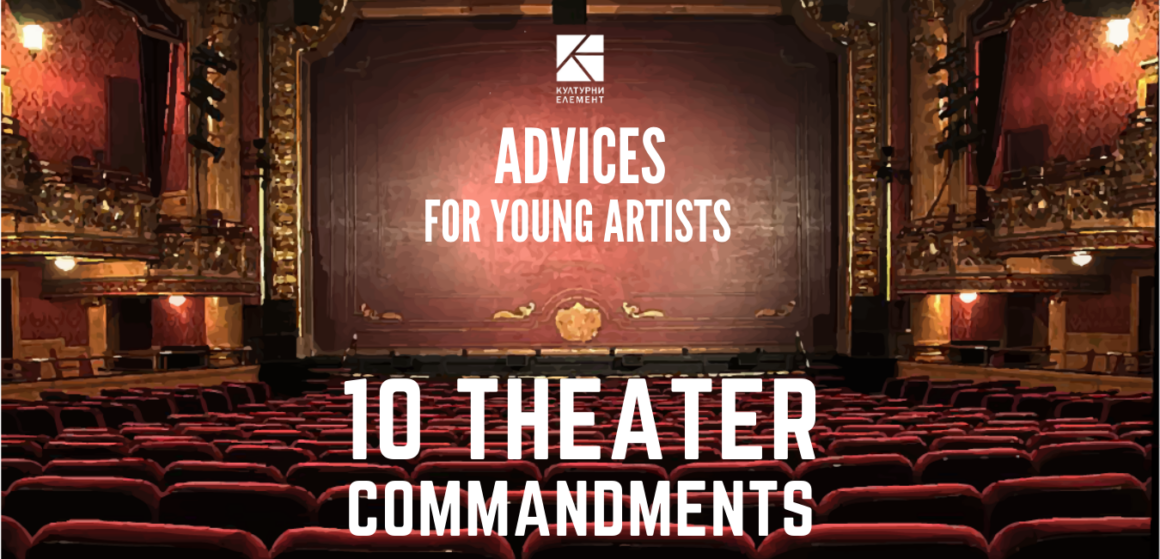Theater
In desire to pass on important and key knowledge from various artistic fields to young artists who are starting their careers, we are very happy to launch very anticipated and previously announced series of articles in the “Advice’s for young artists” section. Be fully prepared to be equipped and familiarized with the core values and practices you will need as you begin your artistic career. Without further notice, the first in a series of topics is “Theater” during which we will go through the preparation, beginning, duration and end of the play, as well as post-production, further life of the play, theatrical terminology and other elementary facts, recommendations and traditions. We hope that these tips will be important to you and that our articles will help you to present yourself in the best light when great and interesting opportunity to start your career pop up. In addition, those who have already started their careers can learn a lot from this also, and we especially think about opera and musical stage artists, who have a very limited access to drama education at the expense of music. We begin this series of articles with a list of ten key tips, which are applicable at every moment of your career and form the basis of good and correct artistic creation. Welcome and enjoy!
TEN THEATER COMMANDMENTS

- Arrive on rehearsal not only on time, but earlier. If you are late, it means that you basically do not care enough, regardless of the reasons for the delay, and thus you send an ugly and amateur image of yourself, you are embarrassing colleagues by letting them waiting for you and generally providing quite bad energy to the work process.
- Say hello to all the collaborators, regardless of their share in the show and the preparation process. Be kind to everyone, from soloists to cleaners. In this way, you will show all your colleagues that you are an honest and pleasant person who is not affected by vanity and who does not have a shifted evaluation system. Never forget, vanity is the death of art.
- Learn your role in detail. Additionally, learn the roles of all the colleagues who are with you in the scene. So you can always help them in case of need. Rehearsals are used to learn other people’s roles, not your own, and think of your perfect knowledge of your role as a gift to the ensemble at the very beginning of the rehearsal process. It’s very ugly and it’s an indication of disrespect to come to rehearsals with unlearned roles, regardless of reasons that really don’t matter at the time.
- Listen and follow the show by yourself. Do not rely only on the call of the stage manager, but on your own sense of responsibility. You are the only one responsible for your own appearance on the stage and the only culprit if that doesn’t happen. Other associates are your support, not your employees.
- Give your maximum at all times. Never do anything half-heartedly, because the audience will feel it first of all, then you will feel bad and the show will not deliver the impact that was planned. Success depends on you in many different ways.
- Look enthusiastic and happy to be part of the ensemble. Never be grumpy or negative. Nobody likes that, not even you. You try to be smiling, to carry and spread positive energy, so everyone will prefer to be in your presence and work with you.
- Praise your colleagues when they express themselves successfully on stage or work hard. Let them know that there is always someone who sees and appreciates hard work and dedication. Tell them when they do something nice, let them know they did a good thing. On the other hand, never gossip. That is very ugly and does not befit an intellectual, an honest man and an artist.
- Respect and listen director. Do as the director tells you even when you don’t completely agree, but always know why and how you do the things on stage. Never contradict the director in front of colleagues, nor challenge his authority over the project, and if there is something you think is wrong, or the director needs support, always do it one on one after the rehearsal. Have tact and feelings.
- After the show, take care of your stage elements as if the show is just beginning. Carefully set aside your costume, save the props, take off the wigs and hairpins, pay attention to the decor. Don’t forget that, even though your play is over at that moment, at that night, the further life of the play is still expected, so be of help to the stage collaborators to put everything in order until the next performance.
- Say thank you to everyone, even when people are just doing their job. That is the most important thing, both in the theater and in life. Be grateful for the wonderful work we do and be its brightest representative.


Leave a Reply